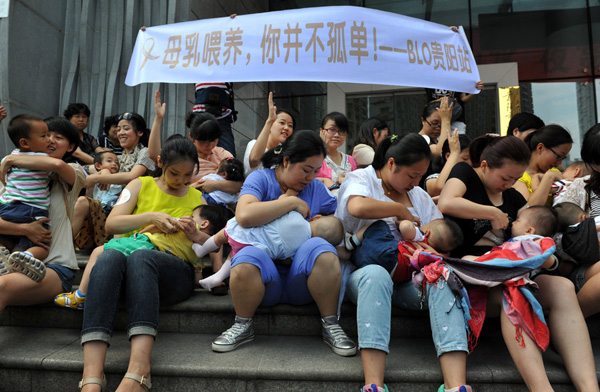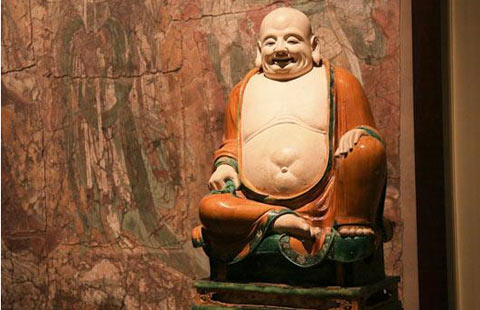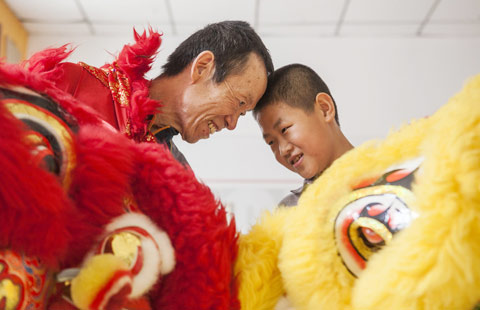Breast-feeding pushed for infant health
Updated: 2015-08-04 07:10
By Wang Xiaodong(China Daily)
|
||||||||
Popularity has declined over past decade with the widespread promotion of powdered milk
 |
|
Mothers feed their children to promote breast feeding at a shopping mall in Guiyang,Guizhou province on July 28, 2014. [Photo/CFP] |
China's top health authority urged on Monday that greater efforts are made to encourage breast-feeding.
It improves maternal and infant well-being, but its popularity has declined over the past decade despite clear health benefits, the authority said.
Globally, about 35 percent of deaths of children under age 5 are attributed to malnutrition, and improving breast-feeding can decrease the infant mortality rate by 13 percent, Wang Guoqiang, vice-minister at the National Health and Family Planning Commission, said on Monday.
Wang was speaking at an event to mark the World Breast-Feeding Week, which continues through Friday.
"China is one of the countries with the highest employment rates for women, and guaranteeing women employees' rights to breast-feeding is very important to decrease the mortality rate of infants and promote their healthy growth," Wang said.
Breast-feeding is the best way to provide infants with the nutrients they need.
The World Health Organization recommends exclusive breast-feeding for babies until they are 6 months old, and continued breast-feeding with the addition of other nutritious foods until children are 2 years old or more. "Breast milk is the most nutritious source for humans and provides complete and rich nutrition for newborn babies. It cannot be substituted by milk powders," said Zhang Shuyi, a researcher at the Capital Institute of Pediatrics.
"It also contains many substances that can increase babies' immune system against diseases," she said.
Less than 28 percent of babies under 6 months old were exclusively breast-fed in China in 2013, compared with 67 percent in 1998, according to the commission last year.
In contrast, the central government wants more than 50 percent of all infants under 6 months old to be exclusively breast-fed by 2020, under a guideline released by the government in 2011.
According to Zhang, breast-feeding has declined for many reasons, including a lack of maternal health education.
The widespread promotion of powdered milk also has encouraged the use of formula, he said.
The central government has taken measures in recent years to encourage breast-feeding, such as issuing regulations to ensure maternity leave for female employees and asking companies to set up special rooms so mothers can breast-feed their babies.
In Beijing, the breast-feeding rate for infants under 6 months old reached 92 percent last year, and 70 percent of all infants under 6 months old were exclusively breast-fed, said Gao Xiaojun, spokesman for the Beijing Commission for Health and Family Planning.

 Tsingtao gets ready for huge beer festival in China
Tsingtao gets ready for huge beer festival in China
 Stunning Shu brocade and embroidery techniques
Stunning Shu brocade and embroidery techniques
 Kazan games: Diving in the sky
Kazan games: Diving in the sky
 Torrential rain wreaks havoc in Jinan
Torrential rain wreaks havoc in Jinan
 A glimpse of Chinese cultural relics in foreign museums
A glimpse of Chinese cultural relics in foreign museums
 Flying Tigers show in New York
Flying Tigers show in New York
 Kobe Bryant frenzy grips Guangzhou
Kobe Bryant frenzy grips Guangzhou
 Three generations keep traditional lion dance alive
Three generations keep traditional lion dance alive
Most Viewed
Editor's Picks

|

|

|

|

|

|
Today's Top News
Obama issues challenge on climate change
GOPs begin pivotal debate week
Negotiation seen as key to China, US cyber solution
Beijing plans 'Silicon Valley' park for traditional culture
Obama issues challenge on climate change with power plant rule
China role crucial in UN plan
Biden associates resume discussion about presidential run
Malaysia seeks help to widen search for MH370
US Weekly

|

|






